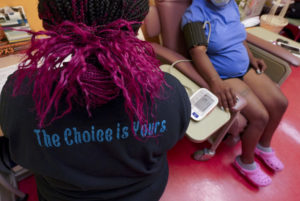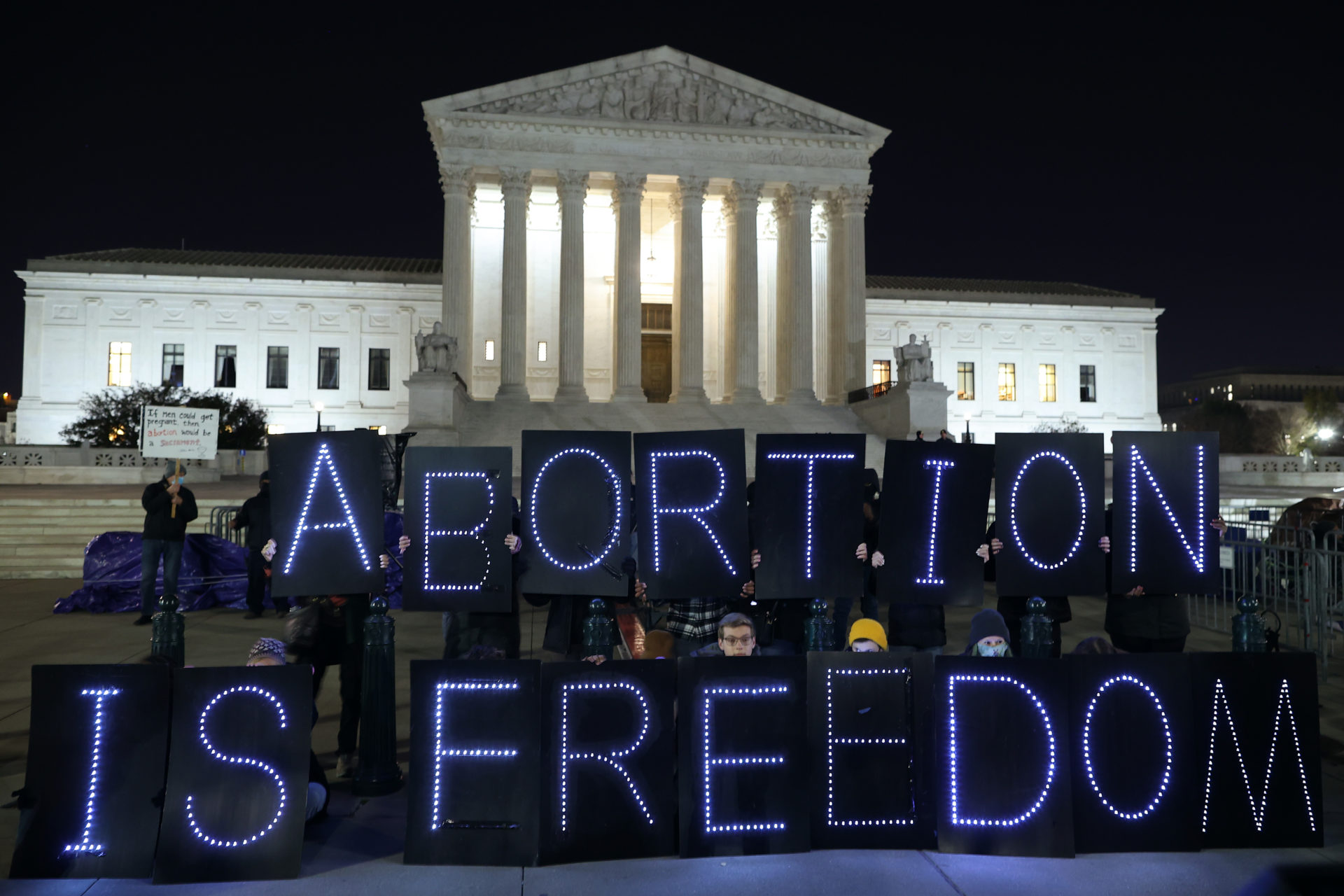The End of Roe? An Interview With Sacheen Carr-Ellis, MD
Written by Alex Casey, Senior Communications Fellow | Published: March 21, 2022
On the morning of December 1, 2021, Dr. Sacheen Carr-Ellis felt positive. She was in Washington, DC, to support her legal team as they argued against Mississippi’s 15-week abortion ban in Dobbs v. Jackson Women’s Health Organization, the Supreme Court case that directly challenges Roe v. Wade, the 1973 decision that legalized abortion nationwide.
Court appearances are not new for Carr-Ellis, the Medical Director of Jackson Women’s Health Organization (and former member of Population Connection’s Board of Directors). The last standing abortion clinic in Mississippi, the pink house, as the clinic is also known, usually finds itself in the Fifth Circuit Court of Appeals on an annual basis. The Supreme Court was new terrain, but Carr-Ellis felt confident that impartiality and common sense would prevail in the nation’s highest court.
Her positivity waned as the day progressed:
When the justices asked their questions, there wasn’t even … there was nothing to argue, they didn’t even make sense. It was all about ideology. And I thought they were justices. They got to the Supreme Court, they should know their own laws. It was absurd and disappointing because I had so much respect for the law. The judicial branch was my favorite branch of government. And now it is not.
Mississippi House Bill 1510 bans abortion throughout the state after 15 weeks of pregnancy, “except in medical emergency and in cases of severe fetal abnormality.” If the ban takes effect, patients seeking abortion after 14 weeks and six days will be forced to carry their pregnancies to term or leave Mississippi to obtain care. There is no exception in the bill for pregnancies that result from rape or incest.
“The ban presents me with an impossible choice: to face potential civil penalties and loss of my Mississippi medical license for continuing to safely provide abortion care or to stop providing my patients the care they seek and deserve,” Carr-Ellis testified in the joint appendix for Dobbs v. Jackson Women’s Health Organization.

In a Center for Reproductive Rights press conference following the Supreme Court hearing, Shannon Brewer, the Clinic Director for Jackson Women’s Health Organization, said the Mississippi ban would have severe consequences in a state with some of the country’s lowest-ranking health and educational outcomes. She added that reversing women’s rights without ensuring any safeholds or opportunities for support was nonsensical.
Roe v. Wade prohibits states from banning abortion before viability—the point at which a fetus can survive outside of the womb—widely recognized at 23-24 weeks’ gestation. Banning abortion two months before viability is clearly unconstitutional … as long as Roe stands.
The Mississippi case is the most important abortion case in nearly half a century because it could weaken or even overturn Roe v. Wade. According to the Guttmacher Institute, gutting or reversing Roe could have drastic implications for millions of women throughout 26 states, 21 of which are certain to ban abortion immediately, through “trigger bans,” and five of which will try to ban abortion as quickly as possible.
If states are permitted to outlaw abortion, they will be in violation of international human rights law, which supports access to abortion. And overturning Roe could influence abortion laws in other countries by setting a dangerous example. Argentina, Benin, Colombia, Mexico, and Thailand are a few of the countries that have recently seen major advancements in the liberalization and decriminalization of abortion. They are also countries that receive U.S. foreign aid. A presidential administration hostile to reproductive rights can have dramatic effects on the provision of aid overseas. The Global Gag Rule and Helms Amendment are just two examples.
The Global Gag Rule blocks U.S. funding from foreign non-governmental organizations (NGOs) that provide abortion services, counseling, or referrals, or engage in advocacy around liberalizing abortion in their own countries—even when those activities are funded with their own non-U.S. money. The Helms Amendment has been interpreted to prohibit any foreign assistance funding from being used for abortion, without exception. Although the Global Gag Rule has been repealed by President Biden, it takes time for new USAID grants to go into effect, for clinics to reopen, and for patients to trust the reliability of their health providers again. Overturning the Helms Amendment requires an act of Congress, and sufficient support currently does not exist.

The Pink House Helps Patients Who Need Services the Most
Originally from the Bronx, Carr-Ellis received her MD from Albany Medical College in 1999. After her residency in obstetrics and gynecology, she completed a fellowship in family planning at Boston University Medical Center. A longtime advocate for reproductive rights and gender equality, Carr-Ellis entered the realm of abortion care because of classism. She found it unfair that some people could have all the access in the world, while others had none. Inequality was part of the reason why Carr-Ellis traveled from her “safe blue-state job” to Mississippi and Alabama, among other low-access states. No week ever looks the same for Carr-Ellis, who is licensed to practice medicine in Alabama, Georgia, Maryland, Massachusetts, Mississippi, and New York, and travels based on the volume of need for abortion services.

When Carr-Ellis joined Jackson Women’s Health Organization in 2014, the clinic provided just over 2,000 abortions per year—today, the number of annual procedures is around 3,800. One out of every four patients at Jackson Women’s Health Organization comes from out of state—mainly from Louisiana and Texas.
While Louisiana allows abortion up to 22 weeks’ gestation, the state requires that patients undergo mandatory ultrasounds and 24-hour waiting periods before a procedure, requiring patients to go to the clinic for two separate appointments. Mandatory counseling that includes erroneous and misleading information is another deterrent. Patients are often falsely told that if they have an abortion they’ll be at heightened risk for post-traumatic stress disorder, depression, other psychological disorders, and breast cancer. Adding to all of these patient burdens, Louisiana prohibits Medicaid and other forms of health insurance from covering abortion services, disproportionately impacting low-income people.
In Texas, Senate Bill 8, which has been allowed to remain in effect since September 1, 2021, limits abortion to six weeks’ gestation. According to Carr-Ellis, it’s often the case that women in Texas try to go to neighboring states to get the care they need, only to be directed to states farther away, such as Mississippi, when their first-choice clinics are fully booked. “They walk into those clinics and you’d think they’d be pissed, but they are lovely, appreciative, and going through so much. They are lawyers, moms with daughters, people who don’t speak English … I’m just so surprised by all they have to go through to get basic health care,” she said. “I have a new appreciation for the women of Texas.”
While the pink house has doubled the number of doctors who fly in from out of state—none of the six doctors on staff are from Mississippi—and expanded its abortion-providing days from two per week to five, the clinic has long wait times for appointments due to the volume of requests for abortion care.
The Mississippi abortion ban—like all abortion bans—is “specifically targeted to poor people and women of color,” who comprise the majority of the clinic’s patients, according to Carr-Ellis. In a Center for Reproductive Rights press conference, Shannon Brewer said:
The majority of the patients we see—they’re barely making it [to the clinic]. The women who will be affected the most will be those needing the services the most because they can’t afford to jump on an airplane, they can’t afford to spend $2,000-$3,000 to go to another state and get a hotel room, childcare—these are the women who can’t afford to do that anyway.
Insulting Questions From the Court
Due to Covid-19 restrictions that prevented her from being in the courtroom, Carr-Ellis supported Jackson Women’s Health Organization’s legal team from a nearby hotel as they endured “absurd” questions and rebuttals from conservative justices and from Mississippi’s solicitor general, Scott Stewart. From Amy Coney Barrett’s comments about safe haven laws—which allow parents to leave unwanted newborns at designated hospitals and fire stations—to Scott Stewart’s insistence that contraception availability means abortion isn’t necessary, the hearing spiraled over the course of two hours into general disregard for the realities of contraceptive failure, high-risk pregnancies, and structural disparities that can hinder ideal reproductive health outcomes for more vulnerable people.
Carr-Ellis said Amy Coney Barrett’s comment about “safe haven laws ‘taking care of that problem’ is an insult.” Asking women to carry a pregnancy to term, give birth, and give up their babies for adoption is not a simple fix for unplanned pregnancy. For one thing, pregnancy and childbirth are risky and physically taxing even when everything goes perfectly. For another, adoption can be deeply traumatic; one researcher who studies decision-making around abortion and adoption says that some women she’s spoken with who gave away their babies carry intense grief for decades afterward. NPR reported on a woman in December who entered into an open adoption after becoming pregnant at 21. When she visits her son, she still cries, seven years later—sometimes, she cries so hard when she leaves the adoptive parents’ house, she bursts blood vessels in her eyes. Sometimes, she throws up.
And as crucial as contraception is, it doesn’t eliminate unintended pregnancy entirely, and it can’t prevent the need for abortion when there are pregnancy complications. Ignoring these key factors, Stewart said, in his closing rebuttal:
Contraception is more accessible and affordable and available than it was at the time of Roe or Casey. … It serves the same goal of allowing women to decide if, when, and how many children to have. … the lowest cost abortion at Jackson Women’s Health is $600 for the abortion, additional costs, and further fees. … Whether somebody is uninsured or not, the costs of contraception are consistently significantly less than those.
Solicitor General Elizabeth Prelogar, representing the Biden administration, pushed back, explaining that even people using contraception can be at risk of unintended pregnancy:
The contraceptive failure rate in this country is at about 10 percent using the most common methods. That means that of women using contraceptives, approximately one in 10 will experience pregnancy in the first year of use alone. About half of women who have unplanned pregnancies were on contraceptives in the month that that occurred. And so I think the idea that contraceptives could make the need for abortion disappear is just contrary to the factual reality.

Patients’ preferred methods of birth control aren’t always available either. Carr-Ellis recalled a situation where, as a provider, she spent “forever” talking with a pharmacist because of trouble getting the right birth control for a patient. Although Carr-Ellis is adept at navigating the health care system, she has personally encountered situations where she finds the right prescription before the pharmacies tell her that they are out of stock or unable to fill a prescription for another reason.
Adding to all of these barriers, states have varying degrees of contraceptive coverage. While some states allow patients to pick up three months’ worth of birth control at a time, others require that patients pick up their birth control every month, making it less likely that they will always be able to do so on time without missing doses. And there are an estimated 19 million women throughout the U.S. who live in contraceptive deserts, where they lack reasonable access to a health center or pharmacy that offers the full spectrum of contraceptive methods. Switching birth control pills may mean driving 400 miles in northern Texas, where dozens of counties lack health centers. Scheduling an appointment for IUD insertion in Arizona may mean waiting four weeks.
According to Carr-Ellis’ research, 94 percent of women who receive an abortion in Mississippi are interested in contraceptive counseling, and almost 70 percent of women are interested in utilizing a method in the wake of an abortion. Yet only about 9.5 percent actually start a method at the clinic. Over 40 percent of participants in the study cited cost and insurance coverage barriers as reasons for not using their preferred methods.
Difficult access to a preferred method and contraceptive failure are issues that can impact anyone. But Black Mississippians are far more likely to report using a less effective method of birth control and relying on publicly funded clinics and insurance for sexual and reproductive health services. “I think we overestimate how much money people can dole out for contraception. Even for a cheaper pill, I think we are overestimating the cash flow that people have to purchase things. Birth control should not be a luxury item, but it seems to fall under that category,” Carr-Ellis said.
While the Affordable Care Act guarantees insurance coverage of contraception with no out-of-pocket costs, obtaining the right method at no cost is not always a simple matter. Some health plans effectively discourage the use of long-acting reversible contraceptives (LARCs) by requiring providers to receive approval before prescription. Others will only cover either IUD placement or removal—not both. The Affordable Care Act has been crucial for making family planning more equitable, but it does not require health plans to cover every contraceptive. Throughout her clinical experience, Carr-Ellis has found that the Affordable Care Act does little to improve access to methods like IUDs unless individual states have regulations that support the cost of the devices. This much is true: Many women still face onerous barriers in obtaining the birth control they want.
The rights granted by Roe have not been equal for everyone, given income disparities and other factors. But access to quality, safe reproductive health care will get vastly worse across the country if Roe’s basic protections are taken away. And that’s not what Americans want.

According to a recent Gallup poll, eight out of 10 Americans believe abortion should be legal in at least some situations. Yet pro-choice voters may be less motivated by threats to Roe than anti-choice voters are determined to overturn it. According to a recent Politico/Morning Consult poll, which surveyed a sample of 2,000 people—the majority of whom identified as pro-choice—42 percent of respondents said they would vote for a candidate who did not align with their views on abortion. Another 26 percent were unsure, or had no opinion, on the matter.
Carr-Ellis believes apathy will not prevail for long, however, especially if abortion bans and restrictions continue to succeed. “There is a tipping point. If lawmakers don’t protect us, people will pay attention,” she said. “I think the politicians will lose their jobs if they keep this up. Women won’t take this forever, their partners won’t take this forever, and women won’t be okay with this. All you need is one friend or roommate to die and you become pro-choice forever, no matter your political party.”

